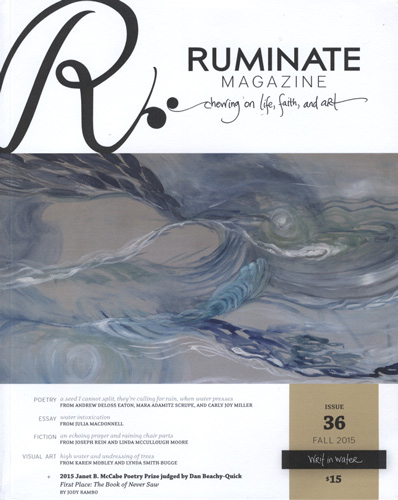Ruminate – Fall 2015
Ruminate explains their choice of title in the beginning of each issue: a “community chewing on the mysteries of life, faith, and art,” and for too long I let the f-word scare me away. Faith. After choosing to leave the faith I was raised in as an adult, what does faith have to do with me now? Would I really be able to ruminate with Ruminate while claiming no faith as my own? But within reading the first paragraph of the editor’s note in the Fall 2015 issue, I set my worries aside. Brianna Van Dyke shares a conversation with her young son about playing with his Spanish-speaking friend and understanding one another, in which he says, “But mostly when he laughs, it’s in English, and I know just what he means . . . And Omar laughs a lot, Mom.” Even if I don’t speak the language of faith, the shared aspects of life and art can give even the most faithless something to chew on. Ruminate explains their choice of title in the beginning of each issue: a “community chewing on the mysteries of life, faith, and art,” and for too long I let the f-word scare me away. Faith. After choosing to leave the faith I was raised in as an adult, what does faith have to do with me now? Would I really be able to ruminate with Ruminate while claiming no faith as my own? But within reading the first paragraph of the editor’s note in the Fall 2015 issue, I set my worries aside. Brianna Van Dyke shares a conversation with her young son about playing with his Spanish-speaking friend and understanding one another, in which he says, “But mostly when he laughs, it’s in English, and I know just what he means . . . And Omar laughs a lot, Mom.” Even if I don’t speak the language of faith, the shared aspects of life and art can give even the most faithless something to chew on.
It helps that Ruminate is a beautiful publication. The care put into producing each issue is evident, with full-color art features (Karen Mobley’s water and heron themed paintings and Lynda Smith-Bugge’s earthy collection of tree sculptures this issue) and extra little tidbits like the Readers’ Notes and Contributors’ Last Notes. Ruminate is intimate and inviting. One can fully sink into each piece and be absorbed.
Especially commanding is “The Journalist” by Joseph Rein. In this fiction piece, journalist Miguel is forced to choose what’s more important to him: reporting on kidnapped children in Guerrero, Mexico or keeping his own son safe. The spare use of Spanish dialogue authenticates the story without isolating non-Spanish-speaking readers. The pain and panic is universal. We can relate even without knowing the exact words with which we’re relating.
As a reader, it was easy to connect Rein’s piece with Julia MacDonnell’s nonfiction “Marie and Her Sons,” and not just because our main characters are both journalists, but because we’re compelled to sink our feet into MacDonnell’s shoes. Writing of her neighbors’ sons who suffer from Fetal Alcohol Syndrome, MacDonnell watches their tired mother, Marie, care for the boys and their ailing father while the author separates herself from their situation, both physically and emotionally, not even learning the names of the boys that she watches almost like a television program. In a way, they stop being real people with real problems. After all, we’re all real people with our own real problems, and sometimes others’ are too much to shoulder with our own. But when Marie’s life across the street crashes down, MacDonnell shows her humanity, bare and raw. There is guilt and regret, even though some of it is egocentric, and there is ugly honesty that readers can see themselves in, even if the mirror’s image doesn’t show us an ideal picture.
For poetry lovers, this issue of Ruminate offers plenty. The Janet B. McCabe Poetry Prize winners open the issue with “The Book of Never Saw” by Jody Rambo as the first place winner. Fans of Emily Dickinson will appreciate this tribute. Second place Andrew Deloss Eaton in “War Notes: Rome, 1940” reads like a message home from war: “ . . . [stop] Please tell Mother about the tomato plant in the door [stop],” making for a creative read.
Ruminate gives a lot to its readers—great writing inside a welcoming, beautiful package. Readers wanting to give back should check out their Art Matters campaign and consider donating after chewing on the mysteries found in this issue.
[www.ruminatemagazine.com]





